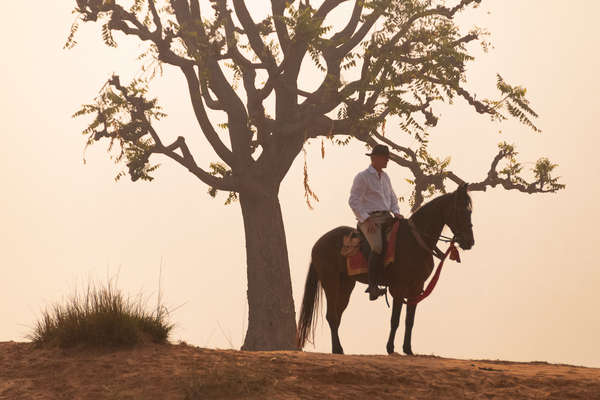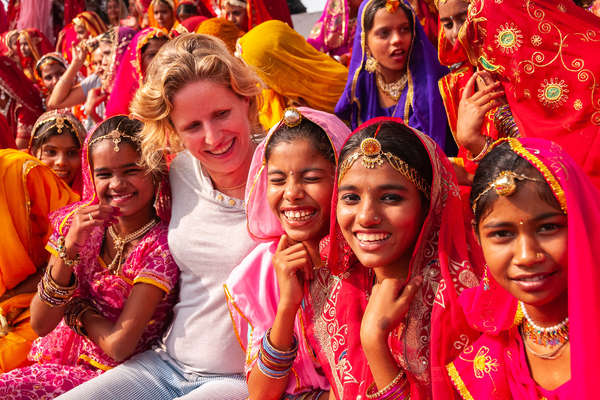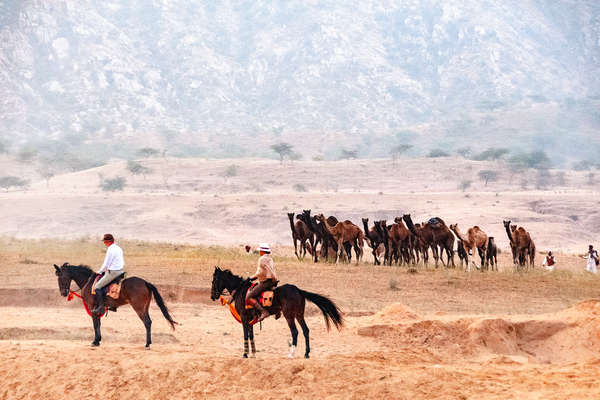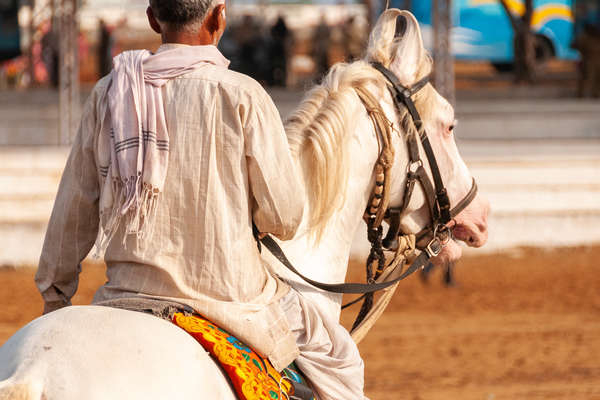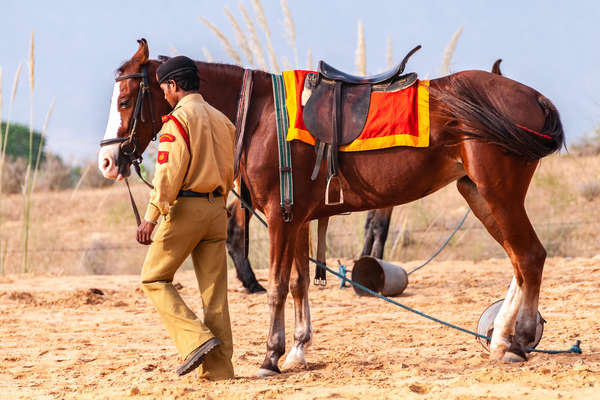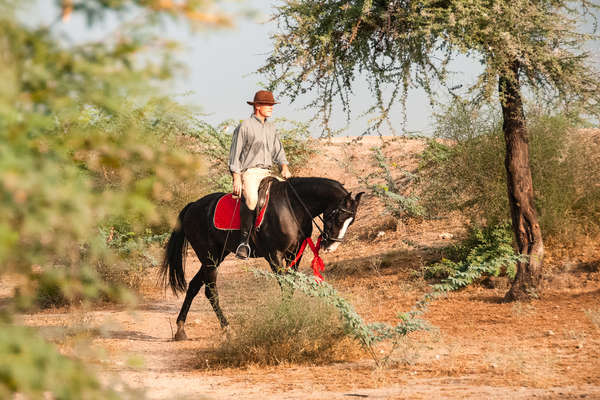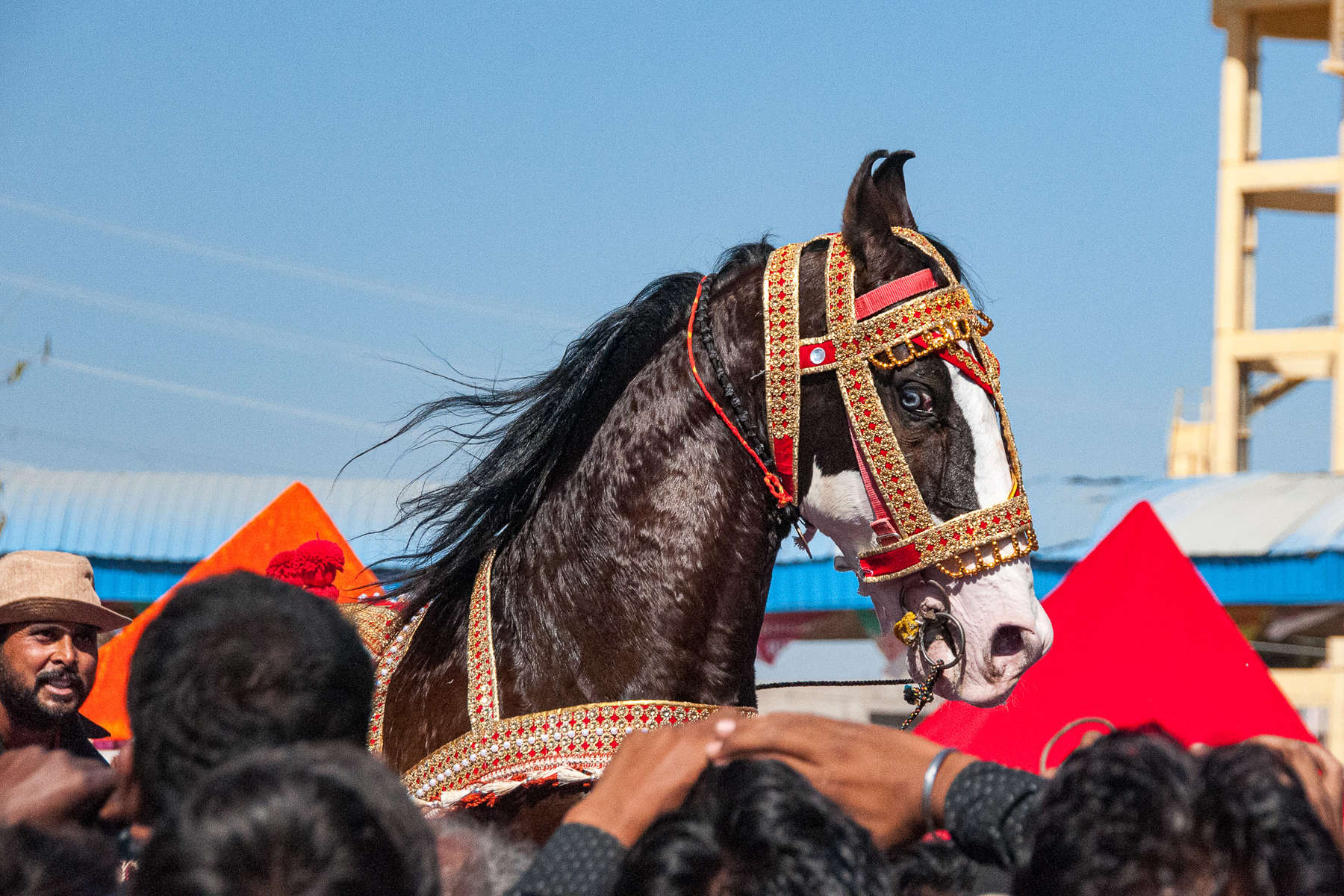
Itinerary
Highlights
- Join in with thousands of colourful Rajasthanis as they watch camels racing and trade their animals
- Fast paced ride on beautiful Marwari horses through varried open countryside
- Stay in a very comfortable tented camp, coupled with grandoise palaces and majestic forts
- See the pink city of Jaipur and the magnificent Amber Fort
- Visit the awe inspiring Taj Mahal and the epic Fatehpur Sik
- Experience true Indian life as you ride through small villages and towns
Dates & prices
Price details
- International flights to Delhi are not included.
- Prices per person are based on two riders sharing a twin or double room/tent.
- All applicable transfers are included, such as Delhi airport transfers and train transfer to Ajmer.
- Groups are usually composed of a minimum of 8 riders and a maximum of 14 international riders.
- There is a single supplement payable if you end up in your own room. The supplement is c. $1430/£1190/€1350 and will be refunded to you if a sharer is found.
- Non-riders are welcome and we will arrange a special jeep itinerary. Please contact us for details and prices.
- You can have an extra day and night (Vasant Contiental Hotel) in Delhi if you want to arrive one day before. Extra cost should be around $110/€100/£90. Please contact us to arrange this for you.
- On certain years, other Pushkar Fair itineraries can be offered which include visits to Ranthambore or Bateshwar Fair. Please enquire for more details and prices.
- Visas are required to enter India and are your own responsibility.
- Weight limit: 14 stones (89 kgs) (196 lbs)
Please Note
The itinerary may be modified at anytime for security reasons, meteorological or events beyond our control such as blocked roads, rivers in flood, drought, strikes and local holidays. Equus Journeys, our local partners and their local guides will always strive to find the best solution and will alter the itinerary as needed.
The names of the hotels and accommodation are given for information only and depending on availability, they may be modified without notice and replaced by another of a similar standard.
Price includes
Support Team
Visits (no riding) : 1 english or french speaking guide
Logistic
1 horse equipped with saddle and bridle per rider
1 team in charge of the horses
Inland transports
All land transfers in an air conditioned van
Accommodation
Double room in hotel or palace in the countryside with private bathroom
Meals
1 bottle of mineral water per day during the ride
Additional equipment
Saddle bags
Extra
Price doesn't include
Meals
Beverage and personal extra
Transports
Visa fees
Insurance
Extra
Camera fees, laundry and personal extras
Optional
Accommodation
Equestrian info
Horses
Guide & local team
Minimum riding ability
Minimum riding ability
Weight limit: 14 stones (89 kgs) (196 lbs)
Pace
Tacking ability and participation
Trip conditions and Requested experience
Visiting a new country offers the opportunity to meet other cultures with different mentalities, therefore it is important to accept these differences and respect the local way of life.
Equestrian equipment
We recommend our riders to wear a helmet to the correct standard and you should bring your own to ensure a proper fit.
Travel info
Comfort
Enjoy sumptuous meals, freshly cooked and delicately spiced throughout.
Meals
Camping help yourself breakfast of toast, cereals, fruit and eggs if you wish. You have a hot lunch and then another hot meal in the evening around the camp fire. The food is varied and tasty Indian cuisine.Contrary to popular belief, all Hindus are not vegetarians and strict vegetarianism is limited to the south. However, you are unlikely to be served beef steak as the cow is sacred. You can expect to eat either goat or chicken.
Water: Take care and do not drink water unless it out of a bottle. It is better to buy mineral water when staying in the towns. The water you will be offered along the trail will be treated.
Limited spirits, wines, beers and soft drinks will be available.
Climate
The rides are scheduled for the cooler months and at this time the maximum temperature would be around 24°C during the day. Please be mindful that evenings can be cool (c. 5°C) and you should bring a warm sweater and be prepared for a chilly morning just in case there is a snow fall in the Himalayas as the temperature does drop suddenly at times. When camping, the nights can be cold are felt much more and you are advised to bring warm clothes for sleeping.
Tips
After the ride, guest usually collect the money in an envelope and hand it over to either your guide Bonnie or Sunayana (his assistant) with the instructions to divide it among the whole team – grooms, camp cook and staff, jeep drivers etc… Budget for c. £40-50 per person in total.
At the hotels, tipping is absolutely discretionary. The bell boys at the hotel handling the baggage do expect a small tip. If you are happy with their services, they may give them around Rupees 50 to 100 – but again, it is absolutely discretionary.
Be careful not to tip too much - being overly generous can affect the general standard of living and destabilise the local economy. If children earn more money than their fathers by begging or asking for money for photos then this can create major distortions within the family.
Packing list
Head
- Equus Journeys strongly recommend that you wear a riding helmet and that you take your own to ensure a correct fit. There are many lightweight options available nowadays
- Sunhat for when not riding
- Sunglasses - with a cord attached so they don't fly off when riding
- Wooly hat
- Buff or Bandana to protect against sand, sun and dust
Upper body
- Long sleeved shirts provide protection from the sun and are an extra layer
- T-shirts
- Lightweight fleece or jumper
- A light waterproof jacket
Legs
- Lightweight, comfortable riding trousers or jodhpurs - we recommend riding in them at home before taking them on holiday to ensure they don't rub
- Casual trousers for the evenings.
- Swimsuit to enjoy the swimming pool of the hotels
Hands and Feet
- Comfortable riding boots. We recommend short boots with half chaps. We don't recommend taking your favourite long leather boots in case they get damaged
- Trainers or equivalent light shoes for the evenings
- Socks
- Gloves - your hands are particularly exposed to the sun
Other useful items
- Towels - camping ones will both dry and pack more easily
- Small backpack 25-30 liters
- Camera and high capacity memory card. Spare battery
- Bumbag for carrying your camera and small items whilst riding
- Headtorch or small torch for moving around camp at night - bring spare batteries and bulbs
- Water bottle (2 litres or 2 x 1 litre)
- Swiss army knife
- Wet Wipes or equivalent (for when washing facilities aren't available)
- Toilet paper and a lighter to burn it with
- Small plastic bags for rubbish
- Ear plugs (for light sleepers)
In your hold luggage
- Any liquids, such as shampoo, moisturiser, deodorant unless they are less than 100ml and all bottles can fit in a small, clear, plastic ziplock bag. We recommend biodegradable washing products where possible.
- Swiss army knife (or equivalent)
In your hand luggage
- Any valuables, such as your camera, ipod, ipad etc.
- Travelling in your riding boots and carrying your hat and some riding clothes is highly recommended - then if your luggage goes astray you are still able to ride!
Medical kit
- Any medication you regularly take
- Sunscreen and lip balm - should be high factor
- Insect repellent, preferably containing deet
- Blister plasters in case of any rubs
- Antiseptic cream, plasters, aspirin, anti-histamine, insect-bite salve etc...
- Spare prescription glasses/contact lenses
- Eye drops
- Imodium or similar anti-diarrhoea medication
- Re-hydration sachets
- Water purification tablets
- Antiseptic wipes
- Handwash gel
Miscellaneous
- We recommend taking a copy of your passport and insurance documents with you in case you lose your originals
- Please take your rubbish home with you. There are no recycling facilities in Rajasthan, so take your used batteries, aerosols etc back home and dispose of them appropriately. Try to leave excess packaging material at home before travelling
- If you prefer travelling in a "light way" please choose a biodegradable soap or washing powder/liquid.
- Please don't take a hard sided suitcase. Your luggage should be soft sided with a capacity of about 80 litres. We recommend taking a backpack or similar.
- Backpacks cannot be worn whilst riding.
- We recommend a small bumbag or a coat with pockets so that you can carry small items with you during the day (camera, sunscreen, lipbalm etc) and whilst riding.
- We recommend travelling in your riding boots and carrying your hat and some riding clothes in your hand luggage - then if your luggage goes astray you are still able to ride.
Sustainable tourism
- Travel light. It's a little known fact, but the lighter you pack, the better for the environment as heavy bags will produce higher emissions (when flying a plane or driving a car!).
- Reduce plastic waste. Take your favorite reusable bottle with you. Avoid single-use bags, cups, or straws.
- Preserve nature. Always take your rubbish with you during the ride and recycle them. Leave all the flowers or plants as you found them, and never get too close when observing wildlife. Make sure to use eco-friendly products such as body wash or laundry detergent (if camping) to protect both your skin and the environment.
- Choose your experiences carefully. Respect animal life by not participating in any activities that abuse wild animals (shows, elephant rides, etc.).
- Support local populations. Buy local handicrafts, be respectful of customs, and learn about the culture of local communities.
- Share! Raise awareness among your family and friends about sustainable tourism.
Did you know?
Did you know?
Pushkar Fair on horseback
During the month of Kartika, the lunar eighth month of the Hindu calendar, breeders throughout the whole of Rajasthan bring their horses and camels to Pushkar for the kartik purima (the full moon). Each year some 200,000 people converge here, bringing 50,000 camels and horses. The city is transformed into a whirlwind of sound and colours. Every year Equus Journeys is organizing a horseback trail special ride during the Pushkar festival.
The fair sole aim of trading cattle includes horses, cows, goats, sheep, camels etc, it is a show for public displays. Once the trading is completed, they decked up the animals with dazzling ornaments and beautiful clothes for public displays.
Next Pushkar Fair dates are 08-14 Nov 2016, 28-Oct-1Nov 2017, 15-23 Nov 2018, 4-12 Nov 2019.

